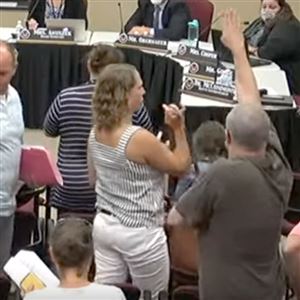Auschwitz survivor and Nobel Laureate Elie Wiesel once said “I don’t compare anything to the Holocaust.” We would be wise to heed and continue to learn from his words.
At recent school board meetings in Fox Chapel, where one disgruntled parent offered the Nazi salute following a vote to follow CDC guidance by mandating the wearing of masks to stop the spread of COVID-19, and in Upper St. Clair, where another aggrieved parent non-ironically compared antiracist education to Nazi policies, the suffering of the Holocaust was appropriated for rhetorical convenience.
Such false-equivalences needlessly stir painful memories, distract from thoughtful public discourse, and dehumanize and intimidate neighbors.
Using Holocaust and Nazi analogies is a trend escalating at a disturbing rate in our increasingly polarized times and one that needs to stop.
Invoking Holocaust imagery and comparisons to Nazis exploits the pain of Jewish memory. As Edna Friedberg of the United States Holocaust Memorial Museum writes, “It is all too easy to forget that there are many people still alive for whom the Holocaust is not ‘history,’ but their life story and that of their families. These are not abstract tragedies on call to win an argument or an election. They carry the painful memories of the brutal murder of a cherished baby boy, the rape of a beloved sister, the parents arrested and never seen again.”
Fox Chapel and Upper St. Clair are home to Holocaust survivors and members of their families as well as descendants of liberators of Nazi concentration camps.
Comparisons to the Holocaust degrade the level of public discourse, shutting down the productive communication necessary for the difficult compromises that underpin our democracy.
Little in contemporary politics — let alone school curriculum — can be framed as “good vs. evil;” and when such a charge is warranted, it should stand on its own without reductio ad Hitlerum, or “playing the Nazi card.”
Resorting to such emotionally manipulative rhetoric and failing to stay within the factual confines of any conversation or debate in turn fails our children by demeaning history, critical inquiry, and speech and debate.
People can and should be able to disagree about the books students read, the critical lessons derived from history, the interpretation of scientific data and more without being labeled as supporters or perpetrators of the systematic effort to exterminate the Jewish community. Yet to hear our contemporary adult discourse, Nazis and Nazism are rampant throughout American life.
We have an obligation, particularly when talking about the education of our children in public and visible ways, to model our expectations of behavior. Use of Holocaust terminology, imagery and analogy does nothing to help plot a better course and future for our children.
Finally, calling school administrators and school board volunteers Nazis and comparing them to those who orchestrated state-sponsored genocide dehumanizes the very people working tirelessly to help our children be the best possible versions of themselves.
Such rhetoric and careless comparisons can even threaten the safety of Jews and other minorities if internalized and acted upon by others similarly blinded by emotion.
We respectfully request that everyone, regardless of inflamed passions, strength of conviction, or political party, refrain from using Holocaust analogies unless referring to actual Nazis or genocides.
Lauren Bairnsfather is the director of the Holocaust Center of Pittsburgh. Aaron Meyer is the rabbi of Temple Emanuel of the South Hills in Mt. Lebanon. Jeremy R. Weisblatt is the rabbi of Temple Ohav Shalom in McCandless.
First Published: August 15, 2021, 10:15 a.m.


